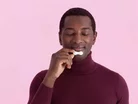Sunrise: the wearable sensor revolutionising sleep analysis

It is estimated that sleep apnoea affects about 1 billion people worldwide, with some research suggesting it is experienced by over 50% of the population in some countries.
The condition is hard to diagnose, as sleep tests are complex and require overnight stays in labs and for the patient to be connected to devices via lots of wires. This is also the case with polysomnography, considered the gold standard for obstructive sleep apnoea diagnostics. It requires specialised personnel to prepare the patient, who is either hospitalised overnight, or sent home equipped with bulky equipment that often disrupts sleep. It is also time-consuming and complex to interpret the data, leading to delays in diagnosis.
Laurent Martinot and his brother Pierre founded Sunrise in 2015, with the aim of creating a simple way to analyse people's sleep behaviour. They were partly inspired by their father, an experienced respiratory physician and sleep specialist, and by their wish to grant everyone access to better sleep.
“Nowadays, anyone should be able to have easy and fast access to certified medical sleep tests for preventing serious health complications stemming from poor quality sleep” Laurent Martinot says.
Using AI to monitor sleep
Sunrise uses a new method of sleep monitoring through a novel biosignal via a wearable sensor placed on the chin. using artificial intelligence, it records jaw movements and matches them to sleep events. "Studies have shown that the chin is an excellent spot for studying our sleep at night. For the first time, all diagnostic information is available outside the hospital setting in normal sleeping conditions with a simple and comfortable test" the founders explains.
The three most common sleep disorders are insomnia, obstructive sleep apnoea (OSA), and restless leg syndrome. In the case of sleep apnoea, when breathing stops and starts during sleep, it remains undiagonised in up to 80% of cases.
"Patients affected by OSA live with consequences of poor sleep: daytime sleepiness, emotional stress, irritability and lack of concentration" the Martinot brothers tell us. "Additionally, OSA can lead to serious comorbidities, in particular cardiovascular diseases, depression, stroke, obesity, hypertension, diabetes and more. Clinical studies show that the death rate in patients with untreated OSA significantly increases over time."
Yet sleep is often neglected, despite being essential to good health. "Such disregard for our sleep health leads to negative consequences on life quality, productivity and increased public health costs. Some scientists even speak of an “epidemic” and point out the lack of public policies regarding the importance of sleep. Nevertheless, the economic and societal impact is enormous."
The cost of sleep disorders
They cite a report published by RAND Europe , showing the cost of insufficient sleep in 5 OECD countries: UK, USA, Canada, Japan and Germany. It presents troubling results showing that, due to poor sleep quality and insufficient sleep, up to $680 billion is lost annually across the five countries.
"Waiting lists in sleep laboratories can be months long in some countries. Furthermore, sleep physicians are often overloaded as their numbers are not suited to the prevalence of the disease. The demand for sleep studies and consequent treatment is greater than available health resources.
"There is an overall consensus within the medical community that more importance must be given to sleep health and the need for raising awareness in the general population."
The pandemic has also had an impact, with the closure of sleep laboratories and redeployment of respiratory healthcare staff to work on the frontline, leading to many patients requiring a sleep test to be placed on hold. Additionally, active COVID-19 patients seem to have higher rates of sleep problems.
"In a situation where hospitals and clinics must remain free for acute and urgent COVID-19 cases, it becomes extremely difficult to sort out those in critical need of sleep tests from the less severe cases. In such instances, an at-home and simple test such as Sunrise will allow to remotely diagnose those in need of treatment. Sunrise offers the possibility for doctors to continue their care of those more vulnerable to the disease."



